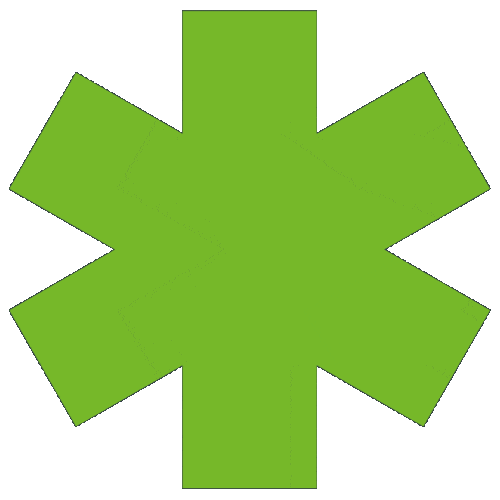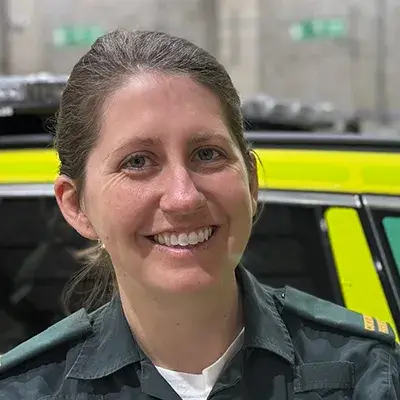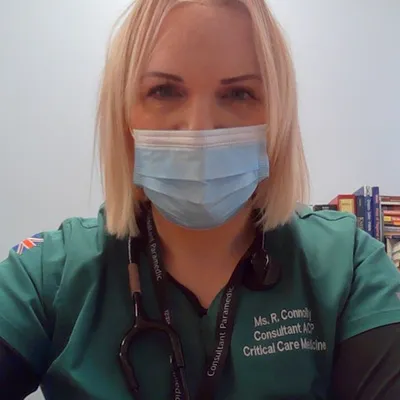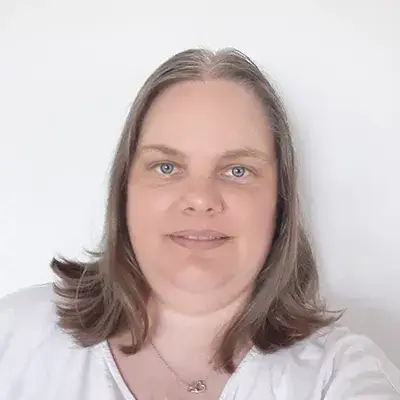Consultant Paramedic
A Consultant Paramedic plays a key role in driving organisational development, particularly within their area of specialist practice and across one of the four pillars of advanced practice. However, they are expected to demonstrate a high level of expertise and competence across all four pillars. In addition to providing advanced clinical care, they may lead or manage a team of advanced paramedics, offering both clinical and organisational leadership of the highest standard. Consultant Paramedics will typically hold, or be working towards, a doctoral qualification.
Case studies
Use the case studies below to learn more about the experiences of different individuals.
Education
Leadership & Management
Research & Development
Clinical Practice
A person’s role may start to develop more formally into the other quadrants. Each person has a pie chart showing how much of the different quadrants is involved in their role.
Below is the colour code for each quadrant:
Education
Leadership & Management
Research & Development
Clinical Practice
Craig Barlow
Consultant Paramedic
20%
20%
20%
40%
Georgette Eaton
Consultant Paramedic Urgent Care
Rebecca Connolly
Consultant Advanced Care Practitioner
30%
50%
10%
10%
Hannah Amondson
Consultant Advanced Care Practitioner
20%
20%
20%
40%
Georgette Eaton
Job title: Consultant Paramedic Urgent Care
Entry route: FdSc

What steps did you take in your professional journey to obtain your current position?
I entered the paramedic profession after completing a foundation degree at Coventry University in 2011. My years as a student paramedic were spent in blue polo shirt and trouser outfit, to distinguish students from the staff in West Midlands Ambulance Service where my placements were. I will never forget the excitement of trying on my first set of green uniform during my induction to South Central Ambulance Service – I was staying in a hotel opposite the training centre and just did a happy little dance in the mirror for the start of my paramedic journey.
I topped up my foundation degree over the following two years, the modules requiring me to work in a minor injury unit and general practice. It wasn’t long after this that I became an Emergency Care Practitioner within SCAS, the name later changing to Specialist Paramedic Urgent Care. I completed my first Master’s degree in Critical Care (there were not many options available to paramedics at the time) and then slipped into a portfolio role, between SCAS, the minor injury unit where I had trained, the local university teaching paramedic science and later on primary care. I worked in this way for a number of years, enjoying the variety the different work spaces offered, and I think this was fundamental to my career development.
It was during my time as Senior Lecturer in Paramedic Science that I completed my second Master’s degree in Education, with initial plans to make this a doctorate. I’d reduced all my working commitments back significantly – a requirement of studying at the University of Oxford was that I worked less than part time hours each week. However, during the time I was studying, the landscape of one of my work settings, primary care, started to change significantly and I had this idea that maybe this area would be worthy of further academic study. I completed this second Master’s degree and enrolled on a DPhil programme, still at Oxford, when my first role in the London Ambulance Service came up. As a Clinical Practice Development Manager for Advanced Paramedic Practitioners in Urgent Care, I could combine the work settings I was enjoying in my portfolio role into one payslip- and this was really appealing to me at the time! One job, encompassing the three clinical settings I enjoyed of ambulance service, urgent care and primary care, plus education and research. I was subsequently successful in obtaining doctoral research funding from the National Institute of Health and Social Care Research, and completed my DPhil in Evidence Based Healthcare in 2024, the same year I was appointed as Consultant Paramedic for Urgent Care in the London Ambulance Service.

What does your typical working week/day look like?
Good question! I don’t think there’s such thing as a typical week as my job is so varied. Each week, a key priority is checking in with the clinical practice development managers for our Advanced Paramedic Practitioners in Urgent Care and our Specialist Paramedics in Primary Care, who I directly line manage. Colleague wellbeing is a key priority of mine and I know that if I look after them, they will look after the teams they lead, who in turn will look after the patients we serve. Checking in with them, troubleshooting challenges and hearing their teams successes is often the highlight of my week – and I love hearing about ideas for innovation that have come from their teams. I love understanding more about my team, and then seeking opportunities to support their development. I enjoy time in my own clinical practice, typically on the APP Urgent Care car as my clinical scope of role, though I’d like to do a little more primary or urgent care than I have time for at the moment! Related to this, I really believe you can’t be what you can’t see, so as a female senior clinician I’m really keen to ensure I am visible clinically in the organisation – my role is pan-London, so I try to get across the city as much as I can. Speaking of which, I LOVE the London Underground. I just think it’s a fantastic feat of engineering and I enjoy the days I need to get more than one tube to go somewhere. I’m also involved with our Trust’s Women’s Network. As with any senior role, I do spend time in meetings and I usually dedicate Thursdays as my ‘teams’ day – which is a necessary evil, but again still an opportunity to connect with colleagues across the organisation and our external partners. I’m also lucky to be able to continue research in my role, and I try to keep at least half a day a week to being innovative – either engaging with research or working with colleagues to undertake research related to the profession.

What is your favourite thing about your role?
Being in a position to make a tangible change really motivates me – and making that change is so rewarding. Having the opportunity to work across different pillars of practice, being clinical practice, education, research, leadership and strategy is just really exciting. Ultimately, I think it’s how the combination of these pillars mean I can make a difference in the care we give to patients, and the support we can give to colleagues in the organisation to develop that really gets me out of bed each morning, and what I hold onto when I find things challenging.

What about your role is most challenging?
Sometimes I put a lot of pressure on myself to be a good leader, and this can be challenging. I certainly feel the weight of being the senior clinician in a room who is expected to know all the answers and make the best decisions, whether that is in clinical practice or in the development of urgent care in the organisation. But I have learnt that whilst uncomfortable, being open, honest and humble helps foster support that means I don’t ever need to be on my own. I am pretty strict in maintaining a good work/life balance for myself – and am deliberate in carving out time with my friends, and focusing on my family when I’m not at work, and I think this is vital to have the mental well-being and resilience to turn a challenge into an opportunity to learn through experience.

What continuing professional development are you embarking on, or thinking about next?
I’ve done a lot of academic study in my career so far, with two Master’s degrees, a Post Graduate Certificate to Teach in Higher Education, a Practice Certificate in Non-Medical Prescribing, the NHS Leadership Rosalind Franklin programme and recently completing a PhD, I don’t have any formal plans just yet! Actually I’m just enjoying the opportunity to engage in professional and clinical conferences as a delegate, as well as clinically-focused CPD. We use Red Whale in my organisation, and so I’m enjoying engaging with this at my own pace, and then contributing to discussions about the content with colleagues. I’m still quite new to my current role, and I recognise that it’s important to be up to date with best evidence and clinical developments, so my immediate focus is on that. In the future, I may want to do something business related, as strategy is a component of my role that I’ve not had much formal education for in the past, so I’ll probably start looking for something to develop my business skills in the future.

What advice would you give to others aspiring to reach your position?
The best advice I could share to seek out opportunity or take hold of the opportunities presented to you – this could be related to the profession, or from outside. Some of the most significant learning experiences I’ve had is from my involvement in Girlguiding UK – so not part of the profession at all! But I’ve been able to transfer these experiences to my roles in clinical practice, education and leadership – and back again to develop as a Guide leader!
I really do think that it’s an exciting time to be a paramedic, as the profession is evolving substantially – so whatever your professional interest, I think you can carve a path towards it. However, staying grounded is also important – the shifts may sometimes be long, but the years are short, so ensuring a good work/life balance to constantly refresh your resilience is vital to sustain a career in Paramedicine.
Rebecca Connolly
Job title: Consultant Advanced Care Practitioner
Entry route: Dip HE

How I got the role?
I only qualified as a Paramedic in 2013 so came into it somewhat later in life after having relatively short careers in the police and in marketing. I felt that I wanted a job that made a difference to people, to have a career in service and in some way make the world a little better. I’d always been drawn to the paramedics when I was in the police, and so it was a natural transition. Once I became a paramedic I soon realised that I wanted to push myself further and so left the ambulance service, undertook additional training in urgent illness and injuries as well as critical care and worked around the country trying to gain as wide as experience in as many different areas that I could. I was therefore working in sporting events with elite athletes, GP surgeries, police custody suites, UTCs, and universities as well as on the road.
Once I started working in Emergency Medicine I fell in love, and quickly found that this was where I felt at home and started to settle. As a result I then undertook my psychology and ACP training eventually undertaking all the necessary competencies to work in the medicine and ED middle grade rota as well as working at a university leading the clinical skills elements of their ACP MSc programme – through this I was lucky enough to be able to write chapters for a number of advanced practice textbooks. I was then recommended a job as a Consultant ACP for the trust where I am now working, directly with the senior medical staff and corporate executives to oversee systems-wide influence.
I also work with the CoP Diversity Steering Group to try and mitigate the barriers others may have in joining the profession, and work as part of the CoP Peer Support Team supporting members undergoing fitness to practice proceedings. As a trans clinician I offer support and guidance on a national level to different public and private agencies.

Are you studying or working towards another role at the moment?
I am currently in the beginning of my clinical doctorate, and still trying to source funding to help lessen the financial burden. I’m also working towards more textbooks.

What I do?
I am responsible at a strategic and leadership level for patient deterioration within my Trust, which includes three separate acute hospitals. I am lucky to have a Critical Care Outreach team of ACPs who I lead and some of my day involves clinical supervision with them, seeing and assessing the most critically unwell and obtunded patients on wards and providing high level expert intervention – we utilise afferent and efferent arms of response (i.e., proactive prediction of patients likely to deteriorate as well as responding to patients who deteriorate and have raised NEWS scores) and so this may involve critical interventions, point of care ultrasound, prescribing of specialist medications, or requesting and interpretations of radiology (e.g., CTs) – we do this fully autonomously and independently, working to ST4-6 equivalence and my teams tend to manage around 92% of all emergency calls to patients without requiring any additional senior medical support (these patients typically are taken to ICU).
I will also check in with my Sepsis team – a team of Sepsis Practitioners who will check sepsis compliance, suggest antibiotics based on culture growth, and assist in cardiac arrests from a sepsis perspective.
Then I will check in with my team of Resuscitation Practitioners who are responsible for the training and delivery of all RCUK courses such as ALS and ePALS. We have also recently started training in RCEM level 1 PoCUS courses and have plans for ATLS/ATNC courses. My Resuscitation Practitioners comprise mainly paramedics and ODPs and are responsible for attending cardiac arrest calls, providing expert leadership in crew resource management, but also being a calm point of call and allowing for debriefs afterwards. They will also analyse trends for us to ensure that correct, timely and cogent education is provided to the wider staff, and have specialised skills in human factors.
In between this my weeks are usually filled with meetings, discussion with the other divisional leaders, and usually trying to find additional funding to help develop my team!

The best bits?
The best bit of my job is working with an incredibly dedicated and wonderful group of staff and being in a position to be able to develop them and make their place of work enjoyable. Underpinning all we do is patient care and while I enjoy the adrenaline rush of being able to manage patients independently (together with the appropriate governance and support in place to allow that) I see the core aspects of my job as bringing my teams together and giving them all the opportunity to flourish and be their full selves. The NHS historically has had difficulties in relation to working conditions and wellbeing so my primary aim is to challenge that.

What do you do to support your own physical and mental wellbeing?
I have a great group of friends with whom I connect regularly and confide in.
Hannah Amondson
Job title: Consultant Advanced Care Practitioner
Entry route: Dip HE

What steps did you take in your professional journey to obtain your current position?
I graduated from the Uni of Herts in 2004 as one of the first graduate paramedics. Worked frontline in London and then transferred to clinical advise doing telephone triage, finding alternative care pathways for patients that did not require an emergency ambulance. Spending some time on a green car, assessing and referring patients to alternative forms of care in the community such as falls teams, GP's etc.
I moved to East of England, working a rapid response car doing a similar role combined with emergency care. I then moved back into telephone when my health deteriorated until I retired in 2015. After a period of recovery and a change in personal circumstances I completed a return to practice course with the Uni of Coventry and secured a practice placement with a GP surgery. I went on to gain my registration back in 2023 and started to help with the e-consults and telephone triage while completing a part time post grad certificate course in first contact practice with the Uni of Cumbria. I was offered a position that worked round my disability, pension and benefits by the surgery I did my placement with. My mentor was an advanced paramedic practitioner who has been a trainer in the ambulance service for many years before moving into primary care.

What does your typical working week/day look like?
I review the e-consults that come in and task them for appointments with the most appropriate clinicians and set a time frame for them to be seen within. Sometimes directing them to self care of pharmacy first services. Any that look urgent I phone to assess and redirect to A and E, ambulance service or book same day appt with GP. I tend to see minor illness/infection such as ENT, chest and female urine infections in all age group. Some times a minor ailment in an older person will turn out to need an urgent referral for possible cancer.

What is your favourite thing about your role?
I see a wide variety of cases, working within a small multidisciplinary team. I am always learning new things and new ways of working from different members of the team. I am given quite a bit of autonomy but there is always support and someone to ask for a second opinion. It challenges my problem solving skills which I love.

What about your role is most challenging?
Seeing patients at first presentation and working out if tests, treatment or even time are the best approach is challenging. I am used to triaging and working to protocols and referring on. I now have to decided what next and when test are appropriate and at what stage. Although there are NICE guideline co-morbidities, time, patient preference and other factors cloud the decision making process and what initially looks like a straightforward decision becomes complex. Time management is another key element within primary care I had not appreciated before. Trying to keep to the allocated appointment times when patients come in with complex medical histories or find it difficult to articulate the problem.

What continuing professional development are you embarking on, or thinking about next?
I am considering doing my prescribing course. However being new to primary care and only just having qualified as a first contact practitioner, working only 1 day a week in practice I feel I need some more experience first before committing to the next stage.

What advice would you give to others aspiring to reach your position?
If you feel that you want a change or want to work more independently or even want to move away from shift work then primary care is a more flexible career option. The skills of a paramedic lend themselves well to primary care- seeing and treating minor illness and injury and ruling out acute illness that needs hospital attention. Many of my colleagues work for primary care network and do home visits within care homes and housebound patients. However due to my previous experience in triage and disability I am based in the surgery. However as my ACP mentor keeps telling me you can make the job your own in primary care, you can pick an area to specialize in . For instance he has chosen dermatology and learning disabilities and does all the mole checks, rashes and learning disability health checks. My area seems to be triage and reasonable adjustments for people with disabilities within the surgery having completed an innovation project on it at Uni and shared my findings with the intermediate care board.
Spending some time researching different areas of the profession and going with your interests would be my advise. Many places are happy to have people come and observe in different settings. Kent and Medway ICB are doing a series of webinars on different roles and a couple of my ACP/ANP collogues have shared how they got to where they are and what they do on a day to day basis.
There are some video case studies on what FCP/ACP paramedics do in primary care on their website too.
https://kmpctraininghub.nhs.uk/primary-care-roles/first-contact-practitioners
https://kmpctraininghub.nhs.uk/primary-care-roles/advanced-clinical-practitioner



